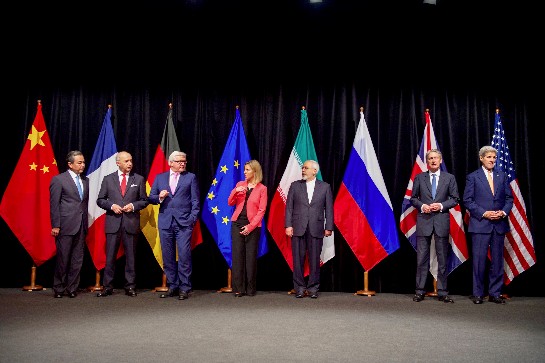 Representatives from the P5+1, EU and Iran via U.S. Department of State
Representatives from the P5+1, EU and Iran via U.S. Department of State
Panel Recap: Can the IAEA Effectively Verify the Iran Nuclear Agreement?
18 days and 159 pages later, a nuclear agreement has finally been reached between Iran and the P5+1.This agreement is not guaranteeing the normalization of relations between Iran and the West, but it does placate one major concern regarding international security. This deal ensures that Iran’s nuclear program will be severely limited to peaceful purposes.
To quickly summarize ASP’s overview of the Joint Comprehensive Plan of Action, Iran will suspend major components of their nuclear program in exchange for the gradual relief of crippling economic sanctions imposed by the international community. Elements of the agreement last from 10-25 years, and Iran must follow through with the agreement’s conditions in order to avoid snap-back sanctions.
The most important measure of the deal lies in the fact that the International Atomic Energy Agency has to comprehensively inspect Iran’s nuclear projects and confirm their nuclear reduction to even begin removing sanctions enforced by the international community. With verification and surveillance measures in place, there is little opportunity for Iran to diverge from the conditions set out.
Yesterday’s panel at the Atlantic Council specifically addressed the capabilities of the IAEA in monitoring and verifying Iran’s compliance to the nuclear agreement. Moderated by Barbara Slavin, the Senior Fellow at the Atlantic Council’s South Asia Center, she was joined by a diverse panel of experts: John Limbert, a professor of Middle Eastern Studies at the US Naval Academy; Thomas Shea, a former Safeguards Official with the IAEA; Jim Walsh, a Research Associate in Security Studies at the Massachusetts Institute of Technology; and John Wolfsthal, Senior Director of Nonproliferation and Arms Control at the National Security Council.
According to the experts, the IAEA is more than capable of monitoring Iran’s nuclear activities—there are over 100 different verification and monitoring systems that can be used in the field—and Iran has too much to lose economically and politically if they do not comply with the mandates. If Iran even slightly errs from its obligations, sanctions can be snapped back into place without the approval of China or Russia (the two countries most likely to block sanctions against Iran).
The panelists discussed the five main responsibilities and challenges that the IAEA will face when monitoring Iran. Firstly, the IAEA has to confirm the prevention and construction of new nuclear facilities. Additionally, Iran has to guarantee that known facilities are not misused, and that all declared nuclear materials are accounted for and are dedicated towards nonviolent programs. To further limit clandestine nuclear operations, the IAEA will have the authority to track imports entering the country. Lastly, the IAEA must verify all other limitations as stated by the JCPOA.
If there is any cause for concern, then the IAEA can increase political inquiries and form commissions to investigate these inconsistencies. There is some leeway for Iran as officials can propose alternative measures to address suspicions without having inspectors come to the site, but at most Iranian officials will have 24 days to address the inspector’s concerns.
Right now, Iran is not only watched by the P5+1 and the EU, but all other countries eager to jump at the chance to discredit Iran. Although concessions were made that will allow Iran to resume elements of their peaceful nuclear program after abiding to the agreement for 15 years, the panelists agreed that there is no other alternative that could have achieved this amount of movement in nuclear negotiations between Iran and the west.





